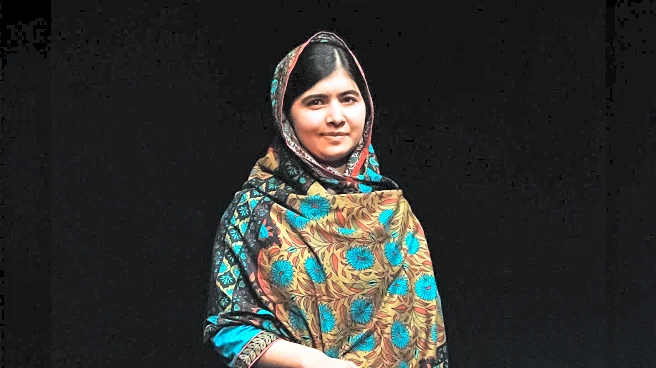What's Happening?
Nobel Peace Prize laureate Malala Yousafzai is sharing her personal journey in her new memoir, 'Finding My Way.' In an interview, Yousafzai expressed her desire for readers to see her as more than an activist,
highlighting her growth over the past decade. The memoir covers her experiences with friendships, marriage, mental health, and activism. Yousafzai first gained global attention in 2012 when she was shot by a Taliban gunman for advocating girls' education in Pakistan. After surviving the attack, she moved to the UK for treatment and continued her education, eventually attending Oxford University. Her memoir also delves into her mental health struggles, including panic attacks and a significant flashback triggered during a college experience. Yousafzai emphasizes the importance of therapy, which she began after a friend's suggestion, and discusses overcoming her fears of marriage, leading to her marriage to Asser Malik in 2021.
Why It's Important?
Malala Yousafzai's memoir offers a deeper understanding of her personal challenges and triumphs beyond her public persona as an activist. Her candid discussion of mental health issues and the importance of therapy highlights a critical aspect of recovery from trauma, which can resonate with many who face similar struggles. By sharing her journey, Yousafzai contributes to the broader conversation about mental health, particularly in the context of surviving violence and cultural transitions. Her story also sheds light on the complexities of marriage and partnership, challenging traditional narratives and offering a modern perspective on relationships. This memoir could inspire others to seek help and embrace personal growth, impacting societal attitudes towards mental health and marriage.
What's Next?
As Malala Yousafzai continues to share her story, it is likely to spark discussions on mental health and the experiences of trauma survivors. Her memoir may encourage educational institutions and mental health professionals to consider more comprehensive support systems for students dealing with similar issues. Additionally, her insights on marriage and partnership could influence cultural perceptions, particularly in communities where traditional views on marriage prevail. Yousafzai's ongoing advocacy work, combined with her personal revelations, may further solidify her role as a global figure promoting education and women's rights.
Beyond the Headlines
Malala Yousafzai's memoir not only recounts her personal experiences but also challenges societal norms regarding mental health and marriage. Her openness about therapy underscores the need for mental health awareness and support, especially for those who have experienced trauma. By addressing her initial fears of marriage and her eventual partnership with Asser Malik, Yousafzai offers a narrative that defies conventional expectations, potentially influencing cultural shifts towards more egalitarian relationships. Her story serves as a testament to resilience and the power of personal transformation, encouraging others to redefine their paths.










